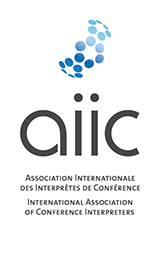
Continued professional development
What sort of professional development is available and useful for conference interpreters? What are the benefits and how can you find out more?
Continued professional development (CPD) can help make you a better interpreter with a broader range of expertise – which can mean more work and more interesting job offers. Read on to discover where to find courses and learn more about the four main course types that professional conference interpreters might find useful.
The nominal benefits of continued professional development (CPD) – learning something new or honing existing skills – are just the tip of the iceberg. Regardless of whether you ‘need’ to do a course or not, CPD can be personally, professionally and financially rewarding.
── Find out the benefits of CPD training
── AIIC Conversations 2: Training and Professional Development
── Sign up to our training mailing list
Types of CPD training
CPD for CPD for professional conference interpreters can be divided into 4 main areas. Some of these categories overlap and of course this is not a formal classification.Your consecutive might be a little rusty, or you might be looking to work from a little-used or new language or into a soon-to-be B language. Interpreting skills courses are rarer than we would like. More often than not they are organised by recognised interpreting schools, AIIC itself, or international institutions (generally, but not always, reserved for their own staff).
Alternatively, you may be self-taught or a recent graduate and want to fine-tune your consecutive and simultaneous techniques. Or you might be a parent whose interpreting has got rusty since taking time out to look after children. There again, you might have learned an accreditation test is coming up and want to take a test-preparation course to check your progress with expert trainers who can give you an idea of the institutions' expectations.
There is a course for all of these and more. Keep an eye on our events calendar
Improving existing C or B languages
If you are looking to improve languages you already work with, you're unlikely to find language classes at a high enough level. As such, you will find yourself doing either specialised knowledge-based courses (for C languages) and/or interpreting skills courses (C and B languages). For more information, check out our Events page .
Adding a new language
Low-level language courses are relatively easy to find for any language you might want to add. Advanced language and culture courses designed for interpreters are often advertised on our Events page
CPD does not only have to mean interpreting and language enhancement. We need to find out and deepen our knowledge of the culture of the countries in which our languages are spoken. For some languages that's a lot of countries!
Also, interpreters work in many different technical areas and discovering something new can be both useful and fun. Aeronautics, international criminal law, vehicle manufacture and patents are all technical areas in which interpreters work and where they could attend courses intended for anyone interested in that field, not just interpreters. And, of course, we have the advantage that we can attend them in several languages!
Universities, cultural institutes and the like all organise such courses.
─── Ancillary skills
Interpreters, particularly freelance interpreters, also need a range of non-interpreting (or soft) skills – accounting, computing, time-keeping, negotiating – to name but a few. As linguists, we might not be naturally good at these other skills. So, if you're not, why not take a course?
Where can I find courses?
Information about all the types of course mentioned above can be found on the AIIC events calendar.
Photo: Green Chameleon/Unsplash
